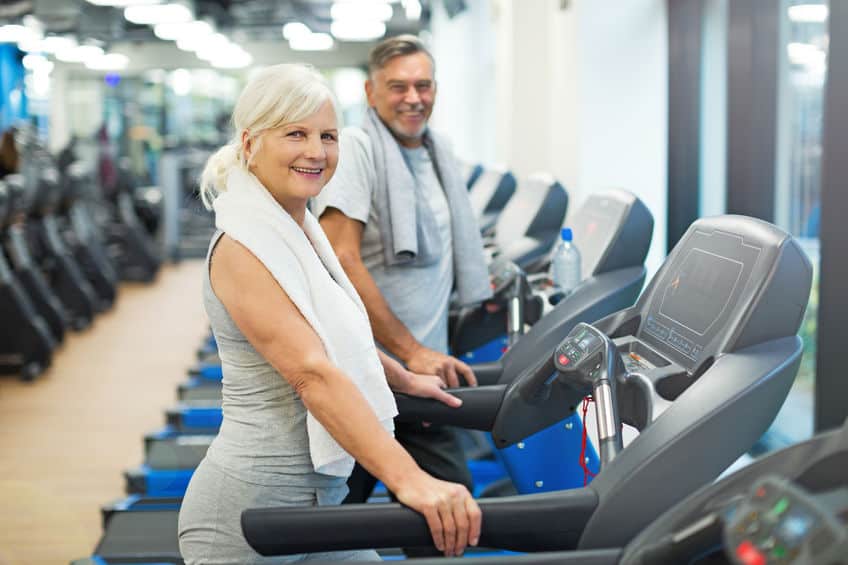- Meeting Someone With Hearing Loss - April 15, 2024
- How Your Hearing Health Influences Your Overall Health - April 5, 2024
- Urban Soundscapes: Navigating Busy Environments with Hearing Aids - March 26, 2024
First-time hearing aid wearers are often concerned that their hearing aid will dictate what they can and cannot do. Even seasoned hearing aid wearers still wonder about the impact that their favorite sports and hobbies will have on their hearing aids. Fortunately, most modern hearing aids are much more robust and resistant to dust and moisture than the hearing aids of the past. This means that with a little care and preparation, your hearing aids can stand up to most any workout. Not only that, but wearing your hearing aids during exercise may actually make your experience safer and more enjoyable!
Benefits of Wearing Hearing Aids During Exercise
You might think that it would be best to play it safe when it comes to exercise, and just leave your hearing aids in your gym bag. For most people, wearing hearing aids during exercise is a good idea and can even improve their workout experience.
Safety
Perhaps the best reason to wear hearing aids during exercise is the same as at any other time: personal safety. Being able to hear clearly keeps you safer and more aware of your surroundings. Whether you’re working out at the gym, biking outdoors, or playing a round of golf, you need to be able to hear what is going around you. From announcements, sirens, approaching vehicles, and those exercising nearby, your ability to hear plays an important role in keeping you and others safe during exercise.
Communication
If you play a team sport or like to workout or train with a partner, it’s important to be able to communicate easily with those around you. There is so much communication in team sports, and being able to hear easily can improve your performance, make you more connected to your environment, and make you a better teammate. For many, going to the gym is as much of a social event as it is as workout. The ability to hear clearly will make catching up with your workout buddies easier and enhance your social life.
Connectivity
Nothing gets you through a tough workout like your favorite tunes pumping in the background. Many of today’s hearing aids connect wirelessly to your mp3 player or phone via Bluetooth technology to stream music directly through your hearing aids. These hearing aids essentially double as headphones for listening to music, hearing alerts from your phone, and even allowing you to take phone calls during your workout.
Tips for Exercising with Hearing Aids
Wearing your hearing aids during exercise can keep you safer, more connected to those around you, and connected to your devices. Showing your hearing aids the same care you show your other workout gear can keep them working better for longer.
Minimize Moisture
Condensation may be a hearing aid’s biggest foe. During exercise, watch out for excessive moisture or perspiration, which can damage your hearing aid. While many hearing aids are designed to resist moisture, this doesn’t make them completely immune to corrosion or bacterial growth. However, by wearing a sweatband or covering your hearing aids with sweat covers, you can reduce the amount of moisture your hearing aids are exposed to.
Secure Your Hearing Aids
Dropping or losing a hearing aid may be a concern for some athletes. If you play contact sports or enjoy active exercises like running or aerobics, you might have trouble keeping your hearing aids in place. Many hearing aid wearers find that close-fitting caps or headbands help to secure their hearing aids during these activities. In addition, hearing aid clips or lanyards will prevent your hearing aids from getting lost, should they fall out.
Have a Post-Workout Care Plan
Following each workout, dry your hearing aids thoroughly to remove moisture and debris. At night, remember to remove the batteries and leave the battery door open to allow trapped moisture to escape. While allowing your hearing aids to dry completely after wearing them is always a good idea, it’s especially important after exercise. A dehumidifier or drying box can help remove moisture and prevent a host of condensation-related problems.
As part of your nightly routine, simply inspect your hearing aids for signs of damage. If your hearing aid shows any signs of wear, discoloration, unusual buildup or just isn’t working as well as it used to, it may be time to have it looked at. Don’t be afraid to bring it in to your audiologist to make sure it’s still in good shape.
Questions?
If you want to learn more about how to get the most out of your hearing aids, contact Whisper Hearing Centers today. We’ll be able to show you the best ways to keep your hearing aids in top shape, no matter what activities you enjoy. Call 317-865-2337 or follow this link to contact us today!

